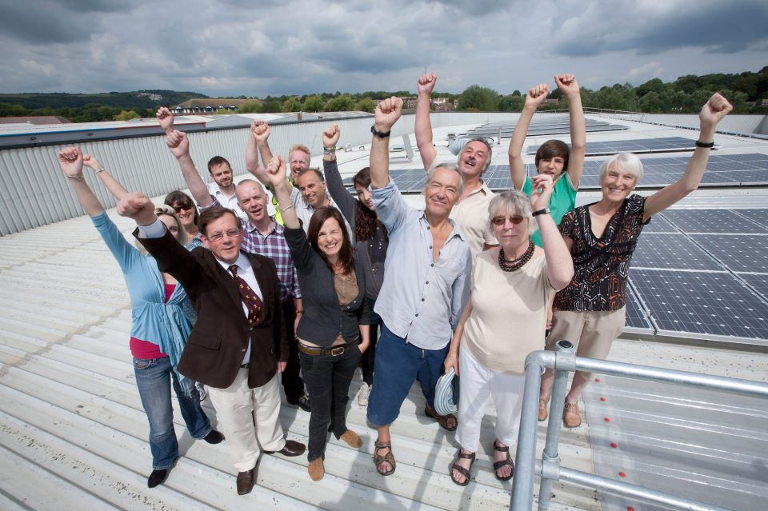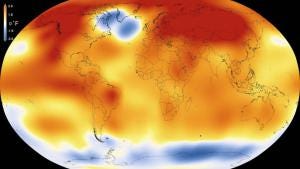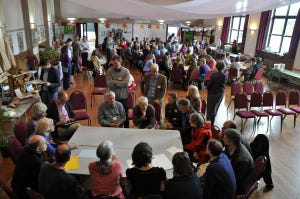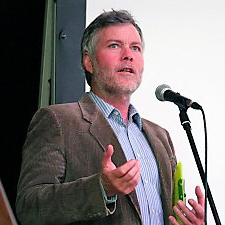Perhaps we all agree the current economic system is the problem. This is, of course, a generalisation which could be endlessly unpicked and elaborated. But if we’re concerned about global warming, biospheric damage, inequality, etc, the globe-sized elephant in the room, so to speak, is the dominant economic system powered by fossil fuels and predicated on endless consumption and growth. It’s efficiency-oriented and centralising, concentrating ever greater economic and political power in the hands of oligarchs and autocrats, which means change will not come easy.
Perhaps by now we also know that change is coming one way or the other. Experts warn we must rapidly reduce the energetic and material throughput of the global economic system by orders of magnitude in the coming years or face severe consequences, including a variety of collapse scenarios. These consequences will hit real people in real communities in our towns, cities, and surrounding regions. This suggests what’s needed is not just a radical rethink, but a radical reconfiguration of how we meet our needs.
At least part of the solution lies in developing alternatives to this system — alternatives that are just and inclusive, ecologically wise and socially regenerative, diverse and resilient. These alternatives should also be descentralising, shifting economic and political power back to communities and democratic institutions. And all of this in the context of dramatically less consumption of energy and material, while somehow delivering wellbeing for everyone. There is no bigger innovation challenge, however you may wish to think about innovation.
If we want these kinds of alternative economic systems, we must act to bring them into being. To do so, we must create the conditions for new economic actors, relationships, and models to emerge, take hold, and thrive. This proposition is useful, inviting us to think in terms of systems. Local and regional economic systems, while complex, are typically human scale and intuitively graspable. The logic is straightforward and guiding, suggesting a theory of change and development.
One might ask, ‘what about existing actors, relationships, and models — shouldn’t they change, too?’ Obviously. Regulation, legislation, litigation, boycotts, campaigns and moral arguments might be routes to compel change. All welcome and necessary efforts. The green and ethical consumer movements suggest that making better consumer choices provide market incentives to producers, who would rationally respond by becoming greener and more ethical. It’s given rise to the CSR and corporate sustainability industries employing thousands. Walmart may be the exemplar corporate case. But progress on this front, while also necessary, is too little and too slow. Besides, the business models of many large companies, such as Walmart, are inherently unsustainable, and possibly unethical, too.
This brings us back to the kinds of economic alternatives called for above and the necessity for our communities, towns, cities and regions to take action to rapidly transition to new models. New models and relationships? There’s an abundance of specific and workable concepts, many of which are already working somewhere — cooperatives, commons, social enterprise, local entrepreneur forums, mutual credit systems and currencies, circular economy and industrial symbiosis, biomimicry, permaculture, agro-ecology, CSAs, CLTs, Green New Deal, carbon taxes, Gross National Happiness. There’s no shortage of new models and relationships that could contribute to acceptable alternatives.
While some of these alternatives require change at the macro and state level, citizens, in the broad and most essential sense of the term, can and must take actions locally beyond the occasional trip to the voting booth. After all, the negative consequences of our current system affect real people — us. We have inherent rights to exist, and to personal and collective wellbeing. In our roles as citizens, we have an inherent right to work together to make positive change in our lives wherever we call home and whatever passport we carry. If we’re to radically reduce the size of our carbon and ecological footprint, (something like 80% over the next couple of decades, according to experts,) while adapting to the massive challenges ahead, most of the solutions will be found at local and regional scales. This means people working together systemically to make it happen. Therefore, communities, towns, cities, regions represent the innovative edge-space of economic transition.
In fact, what if communities became incubators for new solutions to their challenges, to begin to take their own economic destinies into their own hands, leading transitions to new local and regional economic systems with the characteristics we’re talking about? By taking actions in the following four areas, citizens can begin to create the conditions for new economic actors, relationships and models to emerge and thrive:
- catalyzing a transition-oriented entrepreneurial culture — if we want new actors, relationships, and models, enterprising people will have to make it happen. People will have to start new firms and projects, whether cooperatives, solidarity or commons projects, anchor institution plays, peer-to-peer, social enterprise, sole proprietorships, partnership, non-profit, etc; whether the goals are creating meaningful livelihoods for young people or de-coupling from the corporate global supply chain; whether within a market system or outside it. ‘Entrepreneur’, ‘investor’, ‘banker’, ‘incubator’ are cultural constructs, so we must appropriately redefine ‘entrepreneurship’, ‘investment’, ‘banking’ and ‘incubation’, as well as the social norms and stories giving meaning to these processes, and the roles required to animate them. Projects like local entrepreneur forums, social enterprise events, film nights, workshops, newsletters and blogs, local newspaper stories can all help to make visible the possibilities of starting transition-oriented ventures, to invest in them, support them, and tell and spread positive new stories about what it means to do so.
- mobilising local and regional social and financial capital — almost everywhere there are people with skills, know how and financial assets of whatever modest or abundant quantity. Mobilising these assets for local and regional economic transition may not be sufficient for achieving all aims in the long run, but it’s necessary for getting things started, involving the community, building community wealth, creating local accountability, and creating the conditions for attracting more from other sources, such as foundations, impact investment funds or government. Projects like the Local Entrepreneur Forum, Local Investment Opportunity Networks, Slow Money networks, hack-a-thons, skill shares, mentoring and coaching programmes, and legal models such as cooperatives, Community Benefit Societies, and Community Development Financial Institutions, are proven pathways for organising the social and financial capital in a place for supporting community-beneficial enterprises. When local people are investing themselves in local enterprises and projects, that also contributes to a cultural shift.
- building supportive and regenerative ‘enterprising ecosystems’ — transition-oriented enterprises start up in the context of a cast of supporting players — networks, co-working and incubation spaces, training programmes, banks and financial institutions, local authorities, etc. An interconnected constellation of such spaces, institutions and structures — and starting them up, where needed — forms an ecosystem providing tangible, useful pathways for new ventures to gather the resources necessary to get started and established. It also creates the conditions that makes visible and possible the idea of transition-oriented entrepreurship and local investment, reinforcing cultural change. Catalyst projects like local entrepreneur forums, hackathons, local investor networks, etc. when run regularly, can form the seeds for a such an ecosystem to develop and/or complement other elements.
- weaving ‘convergence networks’ of diverse individuals and organisations across localities and regions — building horizontal networks comprising diverse actors in the landscape of economic alternatives is essential for creating the conditions for connecting people, resources and ideas, for innovations to emerge and spread, for the practice of solidarity, and for movements to develop. The Devon Convergence is an example of a regional network, which provided a spark that helped lead to the formation of the nascent South West Mutual cooperative bank.
This framework provides a systems-level conceptual map that can guide development strategy and action for citizens, whether acting as entrepreneurs or investors, permaculturists, community organisers, eco-system builders or within the context of an informal group, NGO, local authority or some other organisation. Guided by this framework, community citizens working through all manner of groupings and organisations can begin to create the conditions for the emergence of not just a single new enterprise or project in a place, but a regenerative system that can continuously help to produce many, which may lead to the kinds of alternative local and regional economic systems outlined above.
There are examples of successful citizen-led initiatives that can be understood within this framework. The Totnes REconomy Project has developed projects over the past seven years working in all four areas — the Local Entrepreneur Forum, Project Design Hackathon, REconomy Centre, and Devon Convergence. I’ve mentioned the Local Entrepreneur Forum frequently because it ‘ticks all the boxes’, so to speak, and can be a catalyst project opening spaces and attracting participants to make new projects possible. The results in Totnes have been positive and encouraging.
Other exemplar initiatives whose work might be located in whole or in part within this framework include Calderdale Bootstrap, Berkshares, Boston Impact Initiative, Cooperation Jackson, Cooperativa Integral Catalana, and ‘the Cleveland Model‘ and ‘the Preston Model‘, demonstrating a diversity of approaches to citizen-led economic change.
At this point, it may sound as if these sorts of examples are abundant and happening everywhere, but that’s not the case. These positive exemplars shouldn’t be fetishized, rather, these innovations — as well as others that are producing positive results — should be understood, adapted, further developed, and multiplied wherever it makes sense to do so. We think this framework could be useful and productive in this regard, helping actors in places where nothing is yet happening to understand where to begin and where they’re going, perhaps. And in places where some aspects of this framework are already in play, to understand what to do next to develop additional aspects, rounding out a systems approach to economic transition.
The Transition Towns movement includes hundreds of highly-capable local community groups in dozens of countries who could begin working more purposefully on economic transition. The Totnes REconomy Project is part of Transition Town Totnes and provides an example that is being copied in nearby communities. There is also an emerging international REconomy Community of Practice which aims to help spread innovations such as this through its network of relationships within and outside of the Transition movement.
The wide-spread permaculture community, renowned for ‘systems thinking’, is well positioned to roll up its collective sleeves, adopt this framework and extend the thinking and practice of permaculture to include local economic transition with greater emphasis.
The ‘Preston Model’ in the UK and ‘Cleveland Model’ in the US have created curiosity and growing interest among local government actors, as well as other ‘anchor institutions’, who could become productive partners in supporting economic transition by shifting their procurement patterns toward pro-social local firms. This framework complements the thinking behind these approaches to ‘community wealth building’ and points the way to a wider field of activity.
There are many other networks and communities of practice for which this framework could help accelerate and coordinate their own activities and approaches to creating economic change on the ground, including Degrowth, solidarity economy, social enterprise, community economic development, to name a few. And between all of these various collectivities of change makers, there is enormous potential for collaboration. This suggests the need for cross-pollination and, perhaps, breaking down silos and overcoming fixed identities, something that ‘convergence networks’, such as the emerging CtrlShift Emergency Summit for Change, in the UK, and the international Wellbeing Economy Alliance might address.
This framework represents a start, hopefully, of a more joined up and practical way of thinking about economic transition at local and regional levels, but more importantly, an approach to effective doing that brings about the rapid changes we need. This post is short and there is much more about this approach to be elaborated and interrogated, which I hope to do and invite other to do, as well.
Originally published at enterprisingecosystems.org.








